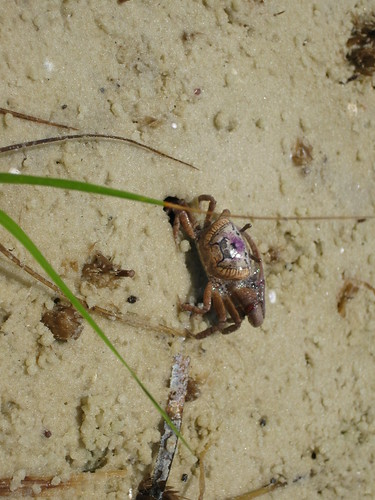Dr. Randall Hughes FSU Coastal & Marine Lab
 I heard an interesting conversation on the radio Friday, with someone posing the question of how long will recovery from the Deepwater Horizon oil spill take. Months? Years? The answer, though unsatisfying, is largely that it depends. It depends how much oil ultimately is added to the Gulf. It depends what habitat you’re talking about (sandy beach, open water, salt marsh). And it depends how effective clean-up efforts are.
I heard an interesting conversation on the radio Friday, with someone posing the question of how long will recovery from the Deepwater Horizon oil spill take. Months? Years? The answer, though unsatisfying, is largely that it depends. It depends how much oil ultimately is added to the Gulf. It depends what habitat you’re talking about (sandy beach, open water, salt marsh). And it depends how effective clean-up efforts are.
(Meet the species of a Forgotten Coast salt marsh)
Unfortunately, previous research suggests that in salt marshes, at least, we’re probably talking decades. For instance, studies of a 1969 spill in Massachusetts (three studies: 1–2–3) find that oil can stick around in the marsh sediments for at least 40 years and continue to have negative impacts on marsh residents like fiddler crabs and mussels long after things appear to be “back to normal”. Lower abundances of these important plant associates may contribute to the lower biomass of cordgrass (Spartina alterniflora) in oiled vs. un-oiled areas, even after decades.
Salt marshes provide habitat for lots of animal species in addition to crabs and mussels, and many of these animals are of interest to us because we like to catch and/or eat them. For example, blue crabs, mullet, seatrout, and red drum all spend at least part of their life amongst the grasses of the salt marsh. Lots of snails and bugs also call the marsh home. Some of these critters benefit the marsh, such as the fiddler crabs whose burrows aerate the soil and the mussels that add nutrients to the soil, whereas others like snails and grasshoppers can have negative effects on marsh plants. All will undoubtedly be impacted at least to some degree by the infiltration of oil into their home.
My lab and I are continuing to collect data on pre-spill abundances of marsh plants and animals in the FL Panhandle, and should oil arrive, we plan to examine the immediate and longer-term effects of oil on their abundance. Although we will make sure to learn as much as we can from the Deepwater Horizon spill, I want to emphasize that none of us are excited about the “opportunity” to study oil in our sites. We all view this situation as an absolute disaster.
The music in the video was performed by Sauce Boss.
Randall’s research is funded by the National Science Foundation.

